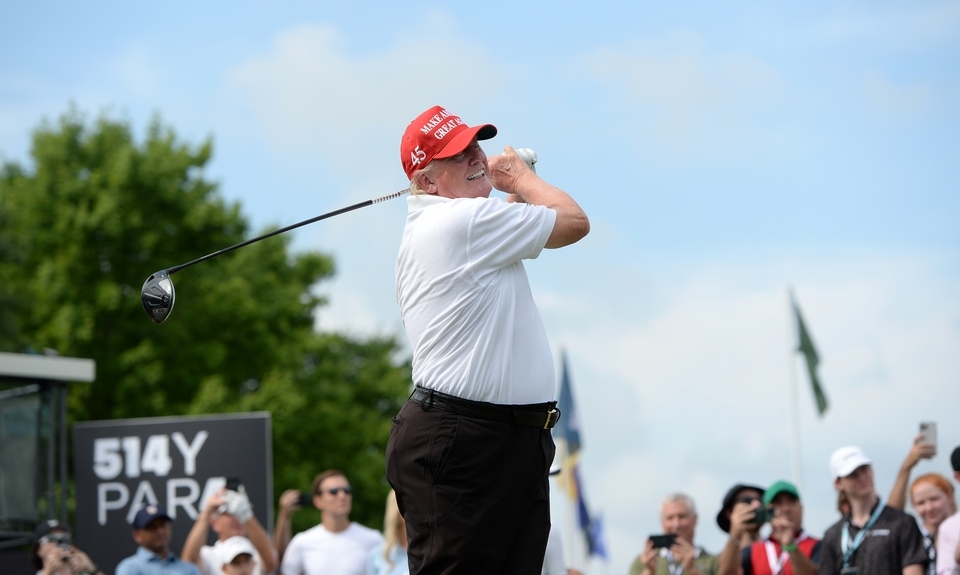Saudi Arabia has just kick-started a new era in world sport: the men’s professional golf circuits, the PGA Tour, the DP Tour and the LIV, backed by the Saudi sovereign wealth fund, have merged. It’s a deal that will take the sport from the North to the South even further.
There was something distinctly Trumpian about this week’s shock rapprochement between LIV, the PGA and the DP Tour: golf center stage; a deal struck (rather than rules and conventions upheld); the outcome achieved following an unpredictable, protracted and often rancorous process; and, of course, with U.S.-Saudi Arabia relations in the spotlight.
It now seems prescient that for his first overseas trip as president back in 2017, Trump headed to Riyadh where he met King Salman. Famously, the two of them were pictured with their hands firmly placed on an illuminated globe during a visit to the city’s Global Center for Combating Extremist Ideology. Somewhat ironically, the issue of Saudi Arabia’s role in the 9/11 attacks has since become deeply intertwined with LIV’s controversial foray into the world of professional golf.
A swing from North to South
Just as that visit to Riyadh has become an iconic moment in the contemporary history of our changing world, so golf’s new détente brings with it some profound implications for sport in the coming decades. The sporting globe is now in the grip not only of the U.S. -which is still the world’s largest domestic sport economy- but also increasingly of Saudi Arabia.
For those who don’t already know this, or who have been taken aback by the PGA’s seemingly rapid capitulation, we are amid a wider pivot in economic and political power from the Global North to the Global South. It might be an inconvenient truth for some, but sport is not immune to what else is happening in the world. Saudi Arabia’s mega-bucks takeover of professional golf is entirely consistent with this giga-trend.
Read also: The rise of international mergers and acquisitions in football
Fans of European soccer already have an awareness of all of this; indeed many of them will be watching this weekend’s UEFA Champions League final between a club owned by Abu Dhabi (Manchester City) and another with a Chinese owner that has close links to the Chinese Communist Party (Inter Milan). The Manchester club has previously faced UEFA action over charges of breaking financial rules. Instead of seeking to counter this, Man City challenged the fundamental nature of the rules- and won.
“Deals not rules”
The global pivot therefore drives to the very heart of how sport as many of us have known it is governed and what its rules are. Historically, many sports, including golf, have largely been underpinned by what are commonly referred to as “Western values.” Among widely accepted principles of good governance in sport are the need for equity, fairness, transparency and democracy. Now, however, countries wielding growing power in sport, such as Saudi Arabia, often take a rather different view of how and why decisions are made, who is involved in making them, and what consequences they should have.
Furthermore, just as the world in general is experiencing a challenge to the post-World War II rules-based order, so sport is also now having to confront challenges to its own established rules. Although the PGA Tour can trace its origins back to the first quarter of the 20th century, LIV Golf has been posing 21st century challenges to the sport’s North American hegemony. As the rules associated with this world order have eroded, perhaps it should no surprise that those who were party to this week’s agreement in golf chose to strike a 21st century deal rather than following 20th century rules and systems of governance.
Read also: In Saudi Arabia, everything must change for everything to remain the same
Former President Trump often refers to the importance of deal-making, which, though he is sometimes derided, is beginning to dominate both the world in general and sport in particular; the mantra “deals not rules” certainly characterizes our age. With rumors already circulating that Gulf states are assessing the possibility of buying NBA franchises, this change in sport governance potentially implies some crucial decisions ahead. While Saudi Arabia trying to buy a franchise team such as the Miami Heat would inevitably elicit cries from U.S. basketball fans of “no way, it’s against the rules,” we should be aware that nowadays deals are there to be struck.
Golf stream
Whether it is Trump, Mohammed bin Salman, or Saudi Arabia’s Public Investment Fund involved in such deal-making, there must be reasons for both sides to do business with one another. For LIV and the PGA Tour, in retrospect the outcome always seemed inevitable: One side had lots of money, a deficit of legitimacy, and was struggling with audience numbers; the other side had a wealth of historically accumulated legitimacy, significant audience engagement, and was weaker financially. It’s almost as though this week’s ultimate outcome was conceived of in downtown Manhattan.
On one side of that deal, the parties involved from the Global North can satisfy themselves normal service has now been resumed, perhaps even that conventional rationality has prevailed, and Western values have won through in the end. Yet viewed from the other side of the fairway, this seems like a pyrrhic victory. LIV Golf was never a disruptor brand intent on shaking up the sport’s future. Rather, it and its financial backers at PIF are conservatives who came looking for legitimacy and a place at global sport’s top table.
Whatever the spin Stateside and from Europe, Riyadh has just gate-crashed a century-old party that will never be the same again. Donald Trump himself would surely be proud of having such an impact; equally, the division and scars left by his presidency are redolent of the turbulence and divisions ahead for professional golf as it tees off into the new future that awaits it.
This article was initially published on Sportico






